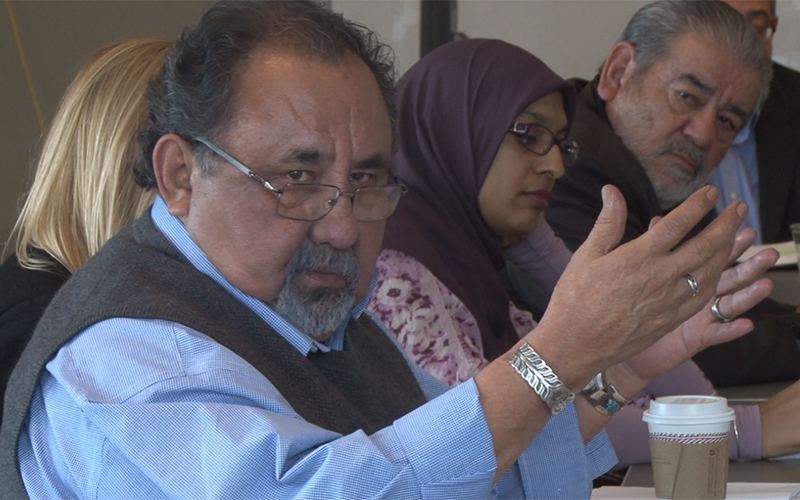AVONDALE – Rep. Raúl Grijalva told about 20 residents and community leaders in his district that highlighting their concerns about President Donald Trump’s actions on immigration would help “interject humanity” into the national debate on the issue.
Grijalva, a Tucson Democrat and first-generation American, has been a staunch and outspoken critic of Trump. He was one of dozens of congress members who boycotted Trump’s inauguration last month.
Though he’s not shy in publicizing his opinions, he was adamant as he sat around a table on Wednesday with about 20 of his constituents in an Estrella Mountain Community College conference room, that hearing the voices of those impacted by Trump’s immigration policies was key.
“Sometimes you’re a leader, and sometimes you’re a follower. I think it’s important to be a follower right now,” he said of following the wishes of his constituents.
He said hearing directly from the people would help put a face to a national issue.
“When you get the face, the tone and the texture of who we’re talking about, I think that begins to have an effect,” he said.
The main topics of the discussion were Trump’s executive orders on immigration, the travel ban and the Department of Homeland Security’s memoranda, released earlier this week, about immigration enforcement policy changes.
Amtul Ahmad, director of public affairs for the central Arizona chapter of the Ahmadiyya Muslim Women’s Association, said that even though she’s a citizen, she is frightened of what could happen to her and the way she could be labeled.
Despite her fears, she was pleased that community members had come together to discuss the issues.
“Whenever this dark time comes, people also come together,” she said.
Brenda Muñoz Furnish, an attorney with the ACLU of Arizona, answered questions that attendees had about their legal rights. She said that although you don’t have to give up your phone passwords to immigration officers, not doing so might make you seem more suspicious.
“If you’re entering the country at a port of entry, pretty much anything goes,” she said.
She said that pending another travel ban from Trump, the ACLU Arizona plans to pick up a coalition of local immigration attorneys that was created in response to the initial ban.
She said these are “not dark times, but times where we need to be a little more cautious.”
(Video by Courtney Columbus/Cronkite News)
Mohammad Ilyas, a physician and board member of the West Valley Islamic Center, shared his experience flying before and after the travel ban. He said he traveled to Dubai and Saudi Arabia about a month ago without ever seeing an immigration officer.
But a few days ago, when he was traveling back to the U.S. from Canada, he said an immigration officer took him into a room to wait without explanation and without water, bathroom, or phone use. He said he was questioned as officers checked databases in Washington D.C. for his name, which he said is a common name.
Ilyas said he wasn’t released until 10 minutes before his flight, so he had to run to the gate. He barely made it, he said.
“This whole thing tells me (the immigration officers) already knew my name was cleared,” he said.
Grijalva said having to catch up with all the executive orders and new federal policies has been difficult, but he and his team know enough now to tell constituents their rights. He said it’s an anxious time. He has had legal residents come to his office concerned that they’ll be “picked up and thrown out.”
It’s often very difficult to tell his constituents there’s nothing within the system that he can do for them, he said. But it’s important to be upfront with them instead of pretending that “something miraculous is going to happen when none of us see it over the horizon,” he said.
“Sometimes they just want people to know what they’re going through because sometimes we can’t help,” he said.
Grijalva said his goal is to work with these community leaders to plan a larger meeting in the future and to “put a human face on this whole discussion.”
He said Trump’s immigration strategy “will fail, but in failing, a lot of people will be hurt.” Moving forward, he said understanding each other is key.
“This issue is about building some capacity for the long haul and building relationships and trust,” he said. “That’s where we’re going to proceed from.”
